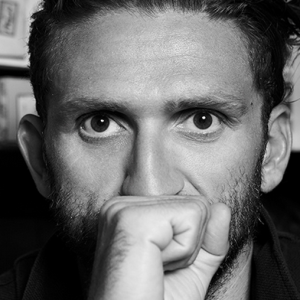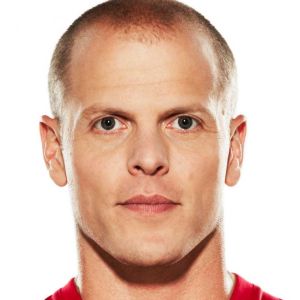Want to know what books Benjamin Humphrey recommends on their reading list? We've researched interviews, social media posts, podcasts, and articles to build a comprehensive list of Benjamin Humphrey's favorite book recommendations of all time.
1

Elon Musk, the entrepreneur and innovator behind SpaceX, Tesla, and SolarCity, sold one of his internet companies, PayPal, for $1.5 billion. Ashlee Vance captures the full spectacle and arc of the genius's life and work, from his tumultuous upbringing in South Africa and flight to the United States to his dramatic technical innovations and entrepreneurial pursuits. Vance uses Musk's story to explore one of the pressing questions of our age: can the nation of inventors and creators who led the modern world for a century still compete in an age of fierce global competition? He argues that Musk... more Elon Musk, the entrepreneur and innovator behind SpaceX, Tesla, and SolarCity, sold one of his internet companies, PayPal, for $1.5 billion. Ashlee Vance captures the full spectacle and arc of the genius's life and work, from his tumultuous upbringing in South Africa and flight to the United States to his dramatic technical innovations and entrepreneurial pursuits. Vance uses Musk's story to explore one of the pressing questions of our age: can the nation of inventors and creators who led the modern world for a century still compete in an age of fierce global competition? He argues that Musk is an amalgam of legendary inventors and industrialists including Thomas Edison, Henry Ford, Howard Hughes, and Steve Jobs. More than any other entrepreneur today, Musk has dedicated his energies and his own vast fortune to inventing a future that is as rich and far-reaching as the visionaries of the golden age of science-fiction fantasy less 
Richard BransonElon Musk is a man after my own heart: a risk taker undaunted by setbacks and ever driven to ensure a bright future for humanity. Ashlee Vance's stellar biography captures Musk's remarkable life story and irrepressible spirit. (Source)

Casey NeistatI'm fascinated by Elon Musk, I own a Tesla, I read Ashlee Vance's biography on Elon Musk. I think he's a very interesting charachter. (Source)

Austen AllredIs there any other book as inspiring as @valleyhack’s biography of Elon Musk?
If there is, please let me know. (Source)
2

“What does it mean to manage well?”
From Ed Catmull, co-founder (with Steve Jobs and John Lasseter) of Pixar Animation Studios, comes an incisive book about creativity in business—sure to appeal to readers of Daniel Pink, Tom Peters, and Chip and Dan Heath. Creativity, Inc. is a book for managers who want to lead their employees to new heights, a manual for anyone who strives for originality, and the first-ever, all-access trip into the nerve center of Pixar Animation—into the meetings, postmortems, and “Braintrust” sessions where some of the most successful films in... more “What does it mean to manage well?”
From Ed Catmull, co-founder (with Steve Jobs and John Lasseter) of Pixar Animation Studios, comes an incisive book about creativity in business—sure to appeal to readers of Daniel Pink, Tom Peters, and Chip and Dan Heath. Creativity, Inc. is a book for managers who want to lead their employees to new heights, a manual for anyone who strives for originality, and the first-ever, all-access trip into the nerve center of Pixar Animation—into the meetings, postmortems, and “Braintrust” sessions where some of the most successful films in history are made. It is, at heart, a book about how to build a creative culture—but it is also, as Pixar co-founder and president Ed Catmull writes, “an expression of the ideas that I believe make the best in us possible.” For nearly twenty years, Pixar has dominated the world of animation, producing such beloved films as the Toy Story trilogy, Monsters, Inc., Finding Nemo, The Incredibles, Up, and WALL-E, which have gone on to set box-office records and garner thirty Academy Awards. The joyousness of the storytelling, the inventive plots, the emotional authenticity: In some ways, Pixar movies are an object lesson in what creativity really is. Here, in this book, Catmull reveals the ideals and techniques that have made Pixar so widely admired—and so profitable.
As a young man, Ed Catmull had a dream: to make the first computer-animated movie. He nurtured that dream as a Ph.D. student at the University of Utah, where many computer science pioneers got their start, and then forged a partnership with George Lucas that led, indirectly, to his founding Pixar with Steve Jobs and John Lasseter in 1986. Nine years later, Toy Story was released, changing animation forever. The essential ingredient in that movie’s success—and in the thirteen movies that followed—was the unique environment that Catmull and his colleagues built at Pixar, based on philosophies that protect the creative process and defy convention, such as:
• Give a good idea to a mediocre team, and they will screw it up. But give a mediocre idea to a great team, and they will either fix it or come up with something better.
• If you don’t strive to uncover what is unseen and understand its nature, you will be ill prepared to lead.
• It’s not the manager’s job to prevent risks. It’s the manager’s job to make it safe for others to take them.
• The cost of preventing errors is often far greater than the cost of fixing them.
• A company’s communication structure should not mirror its organizational structure. Everybody should be able to talk to anybody.
• Do not assume that general agreement will lead to change—it takes substantial energy to move a group, even when all are on board. less 
Mark ZuckerbergThis book is written by the founder of Pixar and is about his experience building a culture that fosters creativity.
His theory is that people are fundamentally creative, but many forces stand in the way of people being able to do their best work.
I love reading first-hand accounts about how people build great companies like Pixar and nurture innovation and creativity. This should be inspiring to... (Source)

Timothy FerrissNo matter your circumstances, storytelling and creativity are two 'meta-skills' that can take your business and life to the next level. Ed is a master. (Source)
3

Whether a marketing campaign or a museum exhibit, a video game or a complex control system, the design we see is the culmination of many concepts and practices brought together from a variety of disciplines. Because no one can be an expert on everything, designers have always had to scramble to find the information and know-how required to make a design work—until now. Universal Principles of Design, Revised and Updated is a comprehensive, cross-disciplinary encyclopedia of design. Richly illustrated and easy to navigate, it pairs clear explanations of every design concept with visual... more Whether a marketing campaign or a museum exhibit, a video game or a complex control system, the design we see is the culmination of many concepts and practices brought together from a variety of disciplines. Because no one can be an expert on everything, designers have always had to scramble to find the information and know-how required to make a design work—until now. Universal Principles of Design, Revised and Updated is a comprehensive, cross-disciplinary encyclopedia of design. Richly illustrated and easy to navigate, it pairs clear explanations of every design concept with visual examples of the concepts applied in practice. From the "80/20” rule to chunking, from baby-face bias to Occam's razor, and from self-similarity to storytelling, every major design concept is defined and illustrated for readers to expand their knowledge. This landmark reference will become the standard for designers, engineers, architects, and students who seek to broaden and improve their design expertise. less 
Benjamin HumphreyEssentially a reference book for product designers, the universal principles is a smartly curated and neatly presented guide to the key terms you'll come across as a designer, with examples and diagrams. A beautiful book. (Source)
4
Across the realms of multimedia production, information design, web development, and usability, certain truisms are apparent. Like an Art of War for design, this slim volume contains guidance, inspiration, and reassurance for all those who labor with the user in mind. If you work on the web, in print, or in film or video, this book can help. If you know someone working on the creative arena, this makes a great gift. Funny, too. more Across the realms of multimedia production, information design, web development, and usability, certain truisms are apparent. Like an Art of War for design, this slim volume contains guidance, inspiration, and reassurance for all those who labor with the user in mind. If you work on the web, in print, or in film or video, this book can help. If you know someone working on the creative arena, this makes a great gift. Funny, too. less 5

THE FIRST MAJOR WORK IN NEARLY A DECADE BY ONE OF THE WORLD'S GREAT THINKERS--A MARVELOUSLY CONCISE BOOK WITH NEW ANSWERS TO THE ULTIMATE QUESTIONS OF LIFE
When and how did the universe begin? Why are we here? Why is there something rather than nothing? What is the nature of reality? Why are the laws of nature so finely tuned as to allow for the existence of beings like ourselves? And, finally, is the apparent "grand design" of our universe evidence of a benevolent creator who set things in motion--or does science offer another explanation?
The most fundamental questions about the... more THE FIRST MAJOR WORK IN NEARLY A DECADE BY ONE OF THE WORLD'S GREAT THINKERS--A MARVELOUSLY CONCISE BOOK WITH NEW ANSWERS TO THE ULTIMATE QUESTIONS OF LIFE
When and how did the universe begin? Why are we here? Why is there something rather than nothing? What is the nature of reality? Why are the laws of nature so finely tuned as to allow for the existence of beings like ourselves? And, finally, is the apparent "grand design" of our universe evidence of a benevolent creator who set things in motion--or does science offer another explanation?
The most fundamental questions about the origins of the universe and of life itself, once the province of philosophy, now occupy the territory where scientists, philosophers, and theologians meet--if only to disagree. In their new book, Stephen Hawking and Leonard Mlodinow present the most recent scientific thinking about the mysteries of the universe, in nontechnical language marked by both brilliance and simplicity.
In The Grand Design they explain that according to quantum theory, the cosmos does not have just a single existence or history, but rather that every possible history of the universe exists simultaneously. When applied to the universe as a whole, this idea calls into question the very notion of cause and effect. But the "top-down" approach to cosmology that Hawking and
Mlodinow describe would say that the fact that the past takes no definite form means that we create history by observing it, rather than that history creates us. The authors further explain that we ourselves are the product of quantum fluctuations in the very early universe, and show how quantum theory predicts the "multiverse"--the idea that ours is just one of many universes that appeared spontaneously out of nothing, each with different laws of nature.
Along the way Hawking and Mlodinow question the conventional concept of reality, posing a "model-dependent" theory of reality as the best we can hope to find. And they conclude with a riveting assessment of M-theory, an explanation of the laws governing us and our universe that is currently the only viable candidate for a complete "theory of everything." If confirmed, they write, it will be the unified theory that Einstein was looking for, and the ultimate triumph of human reason.
A succinct, startling, and lavishly illustrated guide to discoveries that are altering our understanding and threatening some of our most cherished belief systems, The Grand Design is a book that will inform--and provoke--like no other. "From the Hardcover edition." less 
Benjamin HumphreyThis book covers the history of the science behind the universe. Hawking is a good writer, and he has a knack for explaining complex concepts in smart metaphors. I like the book (and his other work) because it really hammers home the cosmic scale and how little time we all have to make an impact and enjoy our life. (Source)
6

In 1992 Vernor Vinge amazed the science fiction world with this epic novel of star-spanning adventure. It won the Hugo Award for Best Novel, and has since become a landmark in the field. Now, with the long awaited sequel The Children of the Sky about to be published, we are proud to offer the first-ever trade paperback edition of this big-screen SF classic.
A Fire Upon The Deep is the winner of the 1993 Hugo Award for Best Novel. more In 1992 Vernor Vinge amazed the science fiction world with this epic novel of star-spanning adventure. It won the Hugo Award for Best Novel, and has since become a landmark in the field. Now, with the long awaited sequel The Children of the Sky about to be published, we are proud to offer the first-ever trade paperback edition of this big-screen SF classic.
A Fire Upon The Deep is the winner of the 1993 Hugo Award for Best Novel. less 
Benjamin HumphreyThis is an immense science fiction space opera which came out in 1992. It covers a lot of themes including AI, aliens, love, betrayal, genocide, and racism. I found the book spectacular in its scale and detail, and original in its ‘zones of thought’ concept, where the galaxy is split into four zones, each with their own laws of physics. There's also the unusual ‘Tines’ race, where each animal is... (Source)
Don't have time to read Benjamin Humphrey's favorite books? Read Shortform summaries.
Shortform summaries help you learn 10x faster by:
- Being comprehensive: you learn the most important points in the book
- Cutting out the fluff: you focus your time on what's important to know
- Interactive exercises: apply the book's ideas to your own life with our educators' guidance.





